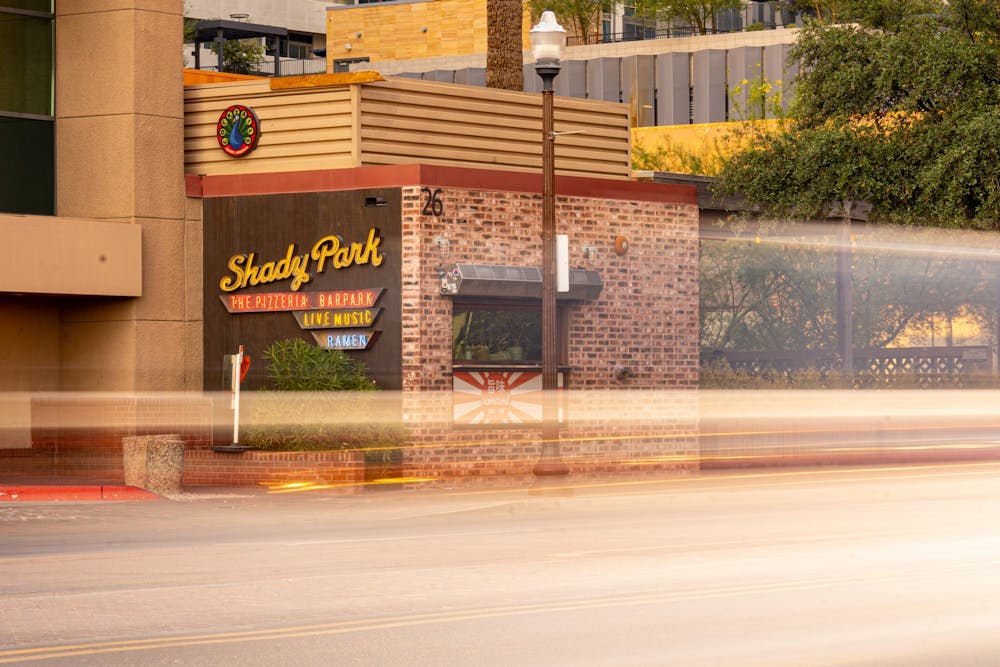At 5:50 a.m. last Thursday, ASU President Michael Crow was heading out for a morning hike. "It's pitch black, and there's a guy waiting in my driveway," he said. "I don't know who this guy is. It's like maybe he's a killer."
The man was not there to kill the president of the University. Instead, the man, seemingly a neighbor Crow did not know, wanted to ask if he'd seen a recent front page of the Wall Street Journal – one that featured a story on Mirabella vs. Shady Park, the legal battle ongoing for over a year.
Mirabella at ASU, a high-rise apartment complex housing retirees near the corner of Mill Avenue and University Drive, opened in December 2020. By the summer, its residents filed noise complaints against Shady Park, a key fixture of house music, food and drinks in downtown Tempe, located right across the street from Mirabella.
By last fall, the complex, along with several residents, sued Shady Park and claimed the live music from the venue was negatively impacting the health and welfare of its residents. And by this past spring, a judge – who afterward recused himself from the case – ruled noise from Shady Park concerts has been a nuisance to residents at ASU's retirement home and surrounding businesses.
READ MORE: Judge sides with Mirabella and restricts Shady Park's concert noise, hours
The legal battle, however, is not finished, as Shady Park's lawyers appealed the decision. Early in 2023, the case will go to trial with a new judge, and the legal dispute is receiving more attention than ever, with the conflict making the front pages of the Wall Street Journal, one of the largest newspapers in the country.
The city of Tempe is also now involved in the legal battle as it filed an amicus brief on Sept. 28 in support of Shady Park, claiming the judge's former ruling was false in naming the area of Shady Park and Mirabella as "principally residential and non-music commercial."
"We've been working to find a resolution," Crow said in an interview with The State Press last week. "Courts are good to solve things when you can't find a resolution. I'd rather find one before that."
A resolution being found outside of court, however, seems increasingly unlikely.
Last July, Shady Park paused live music to construct sound mitigation measures. The venue added a canopy to the outdoor music area, acoustic panels and other materials meant to lower the ambient noise exiting the building. Over the two months the venue was closed, Shady Park paid staff's wages and spent around $300,000 to install the structure, court documents said.
Tempe's amicus brief
Tom Dorough, executive director of Mirabella at ASU, said in an email the city of Tempe was already found to be biased toward Shady Park in the previous judge's ruling and that "this brief is another unfortunate example of the City trying to influence the courts while ignoring its role in approving multiple residential high-rises along University Drive."
Dorough said Shady Park is surrounded by other residential complexes and hotels besides Mirabella. "The City of Tempe approved and welcomed each of these projects, and people in every one of these buildings have complained about window-rattling bass from Shady Park's early morning outdoor concerts," Dorough said in the email.
"These projects take a long time from concept to construction, and the City of Tempe is actively involved in the planning process," Dorough said in the email. "The City helped bring Mirabella to its current location, starting with discussions in 2015 — before Shady Park ever held an outdoor concert."
The amicus brief from the city argues downtown Tempe is a "diverse and thriving place to live, eat, play and work," and Shady Park is included as part of the mixed-use community the city has built.
According to the city, the Superior Court's ruling "threatens the continuation and success of these efforts by determining there is a likelihood of proving that a club's music is a nuisance based on its erroneous classification of the city center as a residential and non-music commercial."
In the amicus brief, it also notes the city said it strives to follow the General Plan 2040, adopted in December 2013. The plan is a land use goal to maintain downtown Tempe, Tempe Town Lake and the University as the central urban core of Tempe.
By following General Plan 2040, the city's goal is to foster a City Center that melds businesses such as Shady Park and residential enterprises such as Mirabella.
The city argued the ruling misunderstood the nature of the City Center and failed to consider the businesses hosting or playing music. The city said the ruling only considered apartments, student housing, and non-music-producing commercial ventures, such as Wells Fargo Bank, Pita Jungle restaurant and Salvation Army near Shady Park.
With the ruling, the city is concerned the area where Mirabella and Shady Park are located could lead to the city being unable to maintain the type of rich and diverse community it has developed and is continuing to develop within the City Center due to the noise restriction.
Edited by Jasmine Kabiri, Piper Hansen and Kristen Apolline Castillo.
Reach the reporters at alrami13@asu.edu and wmyskow@asu.edu and follow @byandrearamirez and @wmyskow on Twitter.
Like The State Press on Facebook and follow @statepress on Twitter.

Wyatt Myskow is the project manager at The State Press, where he oversees enterprise stories for the publication. He also works at The Arizona Republic, where he covers the cities of Peoria and Surprise.

Andrea Ramirez is a part-time reporter at The State Press. She has previously worked for The State Press for Spring ‘23.




